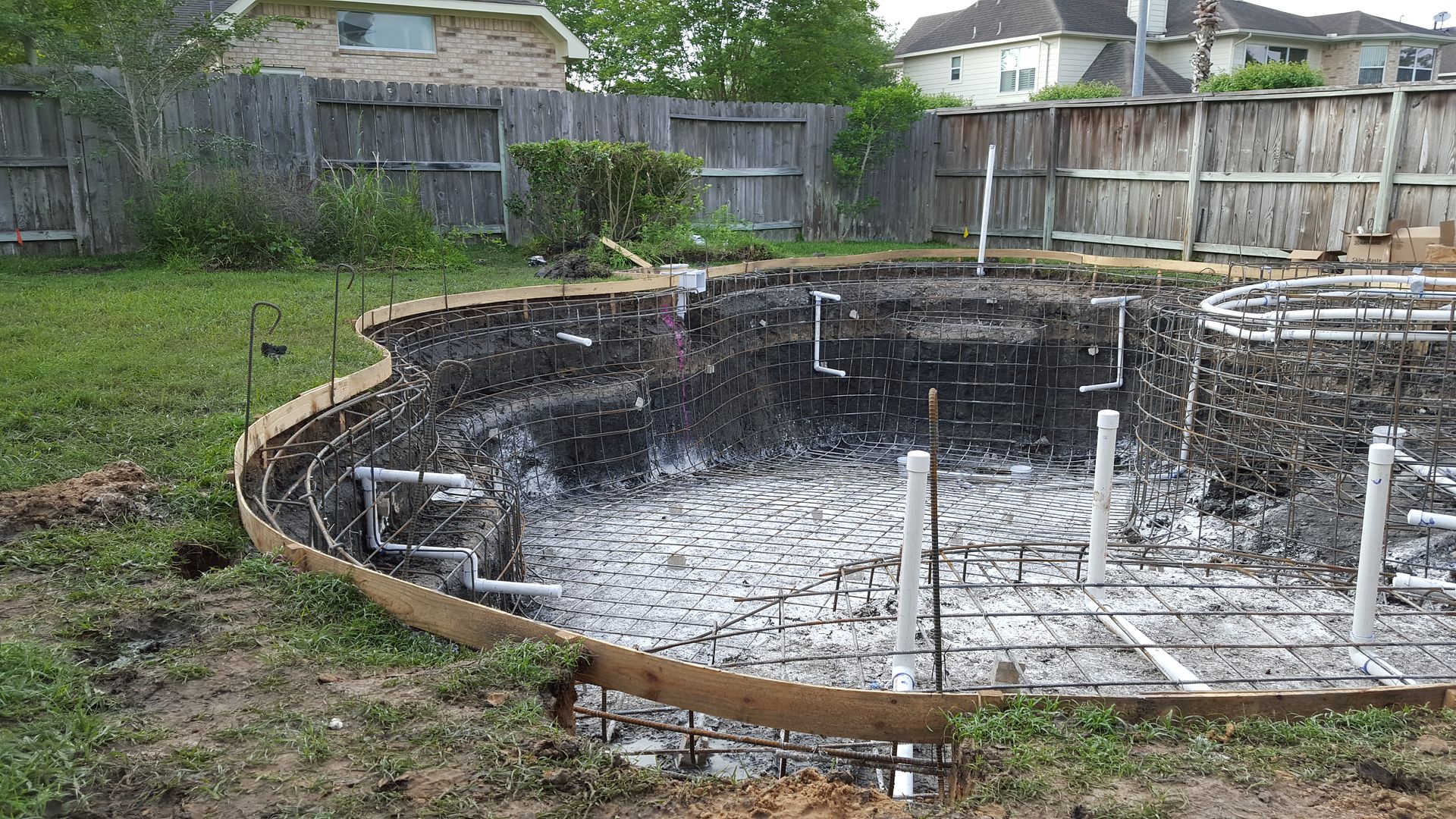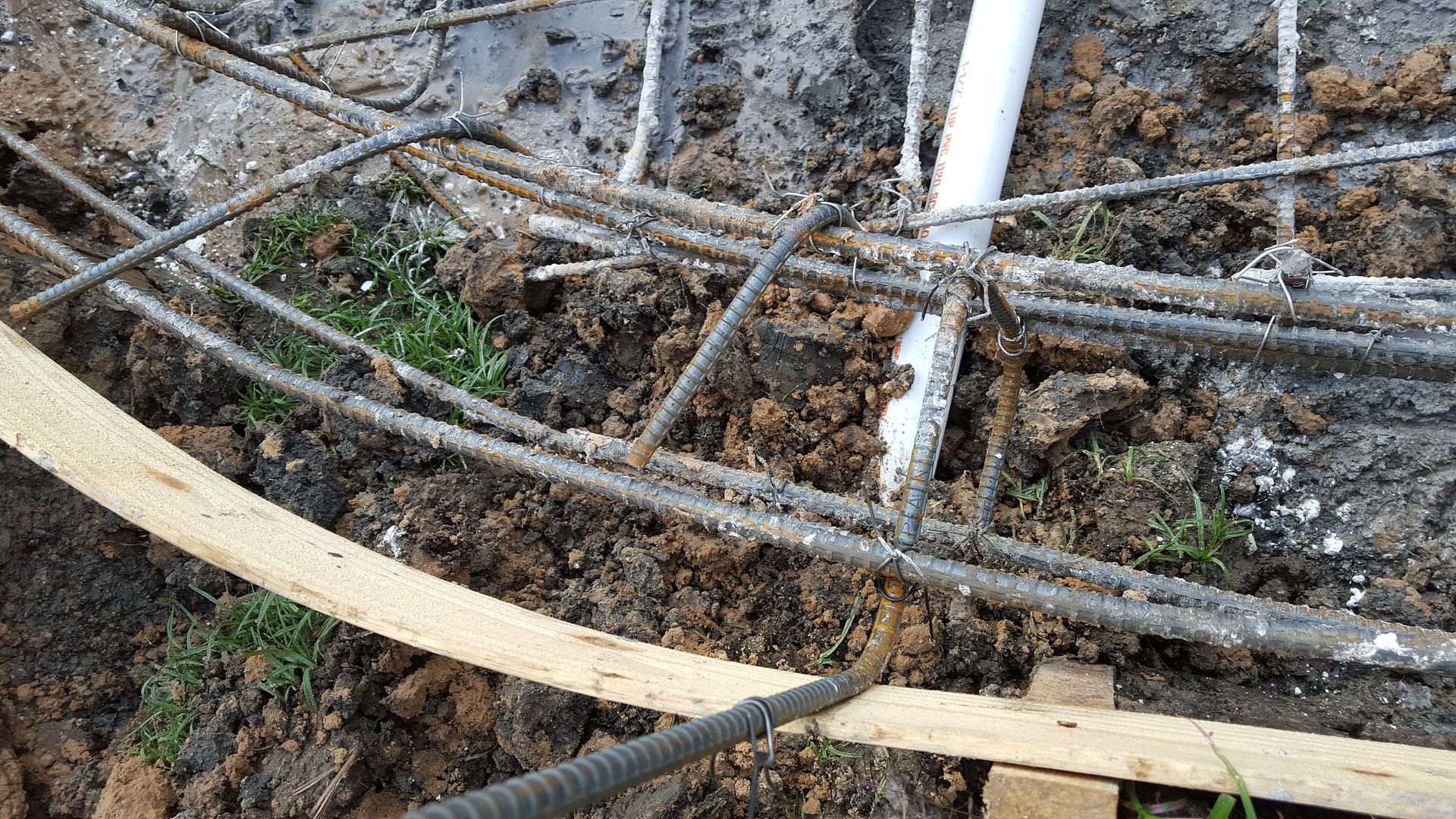My PB said they use a ground fault interrupter system. Does that mean it is grounded instead of bonded? Is bonding required? Got rebar done, plumbing is going on now, and gunite tomorrow. I don't think I saw any copper out there.
Grounding or bonding - Not sure what they did
- Thread starter firehunter
- Start date
You are using an out of date browser. It may not display this or other websites correctly.
You should upgrade or use an alternative browser.
You should upgrade or use an alternative browser.
Bonding to the shell rebar is required at four equidistant points around the pool. It need sot be done before gunite so that the wire can be attached with proper fasteners to the rebar. Bonding is also required to the light niche and any metal ladders in the pool. Is there not an electrical inspection in your area prior to gunite?
They should refer to the National Electrical Code, ARTICLE 680—SWIMMING POOLS, SPAS, HOT TUBS, FOUNTAINS, AND SIMILAR INSTALLATIONS; specifically 680.26 Article 680 - Swimming Pool Installations - Mike Holt
Grounding and bonding are two different things and both are required.
They should refer to the National Electrical Code, ARTICLE 680—SWIMMING POOLS, SPAS, HOT TUBS, FOUNTAINS, AND SIMILAR INSTALLATIONS; specifically 680.26 Article 680 - Swimming Pool Installations - Mike Holt
Grounding and bonding are two different things and both are required.
There should be a thick copper wire running around the pool and connected to the rebar with clamps in four locations around the pool. There should also be a connection to any light niches. the thick copper wire should run to where your equipment pad is and you should be able to connect it to rebar under the deck.
This is separate and apart from grounding the lights or the pump or even using a GFCI. Sure a GFCI is required but it does not take the place of or replace bonding the pool.
This is separate and apart from grounding the lights or the pump or even using a GFCI. Sure a GFCI is required but it does not take the place of or replace bonding the pool.
That is a ground fault circuit interrupter, GFCI as its commonly known. That might mean its grounded but that is completely stand alone of bonding. Generally in order for the GFCI to work correctly, the electrical circuit its hooked up has to be be properly grounded, but that's not always the case.
As for the bonding - every piece of metal, equipment, etc. within 3' of the water needs to be connected together by a bonding wire. This wire effectively charges all the components, be it the pool itself, light, pump, heater, rebar, etc. to be the same voltage. If everything is the same voltage, even if the voltage is very high due to a pump failure, there no potential for current to flow. And every pool must be bonded, most should be bonded per local requirements but for your safety it should be done.
Note - as I type this I want to clarify my very basic understanding. There is a lot of information on the site and elsewhere regarding bonding, grounding and the differences. Please be sure to vet my comments prior to moving forward. At a minimum, you should continue asking until your comfortable. Update - I see you are getting many responses - good. You will get lots of help.
Good luck and I am very glad you noticed now, prior to everything being done.
As for the bonding - every piece of metal, equipment, etc. within 3' of the water needs to be connected together by a bonding wire. This wire effectively charges all the components, be it the pool itself, light, pump, heater, rebar, etc. to be the same voltage. If everything is the same voltage, even if the voltage is very high due to a pump failure, there no potential for current to flow. And every pool must be bonded, most should be bonded per local requirements but for your safety it should be done.
Note - as I type this I want to clarify my very basic understanding. There is a lot of information on the site and elsewhere regarding bonding, grounding and the differences. Please be sure to vet my comments prior to moving forward. At a minimum, you should continue asking until your comfortable. Update - I see you are getting many responses - good. You will get lots of help.
Good luck and I am very glad you noticed now, prior to everything being done.
PB says that is done at the electrical stage. Can they bond at the electrical stage after gunite?
As long as electrical stage is before gunite stage like Tim mentioned you'll be good. All great questions to ask though.
PB says they always bond after and I will see the bonding wire and clamps later. They build in City of Pearland and do it this way too. They must have a way to make it work right, since they build a lot of pools.
The rebar cage tah you see must be connected as described above. That is pre rebar.
Ours was bonded after gunite also. The rebar cage had rebar sticking well outside the shell, bent low along the ground, and that is what bond wire was connected to. I don't see how this would be more or less effective than if it were done prior to gunite. It is bonded to the same rebar it would have been bonded to prior, and that rebar and wire were tied into decking rebar.
Ours was bonded after gunite also. The rebar cage had rebar sticking well outside the shell, bent low along the ground, and that is what bond wire was connected to. I don't see how this would be more or less effective than if it were done prior to gunite. It is bonded to the same rebar it would have been bonded to prior, and that rebar and wire were tied into decking rebar.
firehunter if you can verify this is how they're doing it, it could be very reassuring!
firehunter if you can verify this is how they're doing it, it could be very reassuring!
Sorry!! Got a phone call before pressing send and then realized you saw it before I even posted. [emoji5]
firehunter if you can verify this is how they're doing it, it could be very reassuring!
Yes, after PB explained this to me I was good. I thought we were talking about two different things, but PB just needed to let me know how they do it. As always I will take photos along the way. So lesson learned today was bonding can be connected in more than one way.
PB says trust him and don't worry.
Seems like he has this under control, but the "trust him" makes me nervous. To quote Ronald Reagan, "Trust but Verify".
Feel free to ask more questions as things progress. Our experts in that area will jump in and answer.
Ok.
I will just say that would not work with inspectors I know. I understand he is trying to eliminate a electrician visit. Most Bury the clamps and bond wire in the gunite wall.
I will just say that would not work with inspectors I know. I understand he is trying to eliminate a electrician visit. Most Bury the clamps and bond wire in the gunite wall.
I wish we had a like button.....Ok.
I will just say that would not work with inspectors I know. I understand he is trying to eliminate a electrician visit. Most Bury the clamps and bond wire in the gunite wall.
Ok.
I will just say that would not work with inspectors I know. I understand he is trying to eliminate a electrician visit. Most Bury the clamps and bond wire in the gunite wall.
Will you explain why because I'm trying to understand. If the bond wire and clamps are buried in the gunite, how is the deck tied in? Our electrician came out prior to gunite and did rough electric (along with the plumber who stubbed plumbing), so it was not a case of saving a trip. We had to have a rough electric inspection and a final electric, so the city inspector (in a city where they can be picky) was fine with the way it was done.
I'm just curious as to what the issue would be.
I wish we had a like button.....
We do! It only works if you're using Tapatalk on your phone though!
Thread Status
Hello , This thread has been inactive for over 60 days. New postings here are unlikely to be seen or responded to by other members. For better visibility, consider Starting A New Thread.



